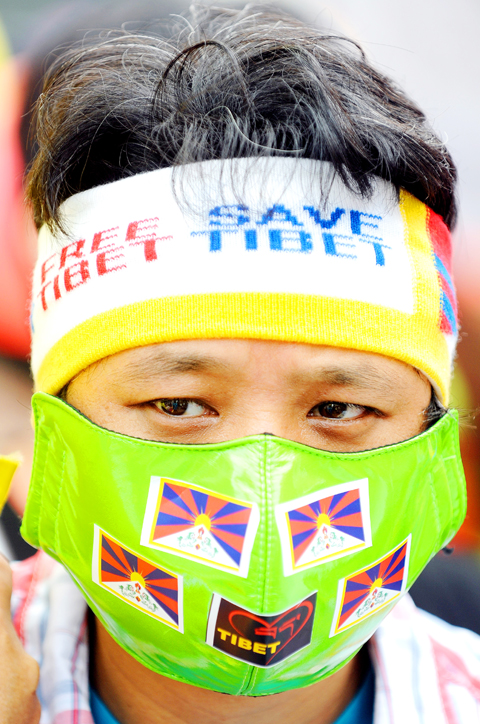More than 1,000 people — Taiwanese, Tibetans, Chinese, Americans, Europeans and Latin Americans — took to the streets of Taipei yesterday to commemorate the 51st anniversary of the 1959 Tibetan uprising.
Holding banners and signs with slogans like “self-determination for Tibet,” “stop cultural genocide in Tibet” and “Stop killing in Tibet,” the crowd departed from Zhongxiao Fuxing MRT station in Taipei and marched to Taipei 101.
“We’re here to remember March 10, 1959, on which more than 100,000 Tibetans took to the streets in Lhasa to protest Chinese occupation of their country and were violently suppressed,” said Chow Mei-li (周美里), chairwoman of Taiwan Friends of Tibet (TFOT), which organized the parade. “We want the Tibetans inside and outside Tibet who are still struggling for their freedom to know that they have the support of the Taiwanese people.”

PHOTO: CHANG CHIA-MING,TAIPEI TIMES
Chow said that yesterday’s date, March 14, also coincided with the latest uprising in Tibet and other Tibetan regions against Chinese rule that began two years ago, as well as the date on which Beijing adopted its “Anti-Ssuccession” Law threatening to invade Taiwan if it “breaks away from the motherland.”
She said the parade route was chosen because it passes through Taipei’s busiest shopping districts and it’s a way to let more Taiwanese know that, as they enjoy their Sunday afternoon shopping or doing whatever they like, there are other people out there without the freedom to do so.
“The parade ends in front of Taipei 101, which most Chinese tourists visit, and we also would like them to hear some different voices from what their government allows them to hear,” Chow said.
As the parade passed, many people stopped, watched and took pictures, while some even waved at the marchers.
Most Chinese tourists seemed quite interested, with many taking pictures or filming the parade, but most declined to comment.
However, one elderly female Chinese tourist called the demonstrators “nuts,” while another middle-aged Chinese man said the demonstrators were too young to know what really happened in Tibet.
Many marchers also voiced concern at the accelerating pace of cross-strait agreements, especially the economic cooperation framework agreement (ECFA).
“Tibetans believed the Chinese and believed in the 17-point agreement they signed with China in the 1950s, but the Chinese broke their promises and imposed harsh measures on freedom and religion in Tibet,” TFOT vice-chairman Yiong Cong-ziin (楊長鎮) said.
Some demonstrators brought placards that read “human rights before ECFA.”
Lobsang, a Tibetan living in Taiwan who was born in exile in Nepal, said he was touched that so many Taiwanese came out to support the Tibetan cause and that he appreciated the support.
Celine van der Cam, a 22-year-old Belgian in the parade, said she joined because she believed the Tibetans’ call to be just.
“The Chinese say they’re doing a lot to modernize Tibet. Well, if the Tibetans don’t want it, they should be left alone,” she said.

An undersea cable to Penghu County has been severed, the Ministry of Digital Affairs said today, with a Chinese-funded ship suspected of being responsible. It comes just a month after a Chinese ship was suspected of severing an undersea cable north of Keelung Harbor. The National Communications and Cyber Security Center received a report at 3:03am today from Chunghwa Telecom that the No. 3 cable from Taiwan to Penghu was severed 14.7km off the coast of Tainan, the Ministry of Digital Affairs said. The Coast Guard Administration (CGA) upon receiving a report from Chunghwa Telecom began to monitor the Togolese-flagged Hong Tai (宏泰)

EVA Air is prohibiting the use of portable chargers on board all flights starting from Saturday, while China Airlines is advising passengers not to use them, following the lead of South Korean airlines. Current regulations prohibit portable chargers and lithium batteries from check-in luggage and require them to be properly packed in carry-on baggage, EVA Air said. To improve onboard safety, portable chargers and spare lithium batteries would be prohibited from use on all fights starting on Saturday, it said. Passengers are advised to fully charge electronic devices before boarding and use the AC and USB charging outlets at their seat, it said. South

Hong Kong-based American singer-songwriter Khalil Fong (方大同) has passed away at the age of 41, Fong’s record label confirmed yesterday. “With unwavering optimism in the face of a relentless illness for five years, Khalil Fong gently and gracefully bid farewell to this world on the morning of February 21, 2025, stepping into the next realm of existence to carry forward his purpose and dreams,” Fu Music wrote on the company’s official Facebook page. “The music and graphic novels he gifted to the world remain an eternal testament to his luminous spirit, a timeless treasure for generations to come,” it said. Although Fong’s

WAR SIMULATION: The developers of the board game ‘2045’ consulted experts and analysts, and made maps based on real-life Chinese People’s Liberation Army exercises To stop invading Chinese forces seizing Taiwan, board gamer Ruth Zhong chooses the nuclear option: Dropping an atomic bomb on Taipei to secure the nation’s freedom and her victory. The Taiwanese board game 2045 is a zero-sum contest of military strategy and individual self-interest that puts players on the front lines of a simulated Chinese attack. Their battlefield game tactics would determine the theoretical future of Taiwan, which in the real world faces the constant threat of a Chinese invasion. “The most interesting part of this game is that you have to make continuous decisions based on the evolving situation,